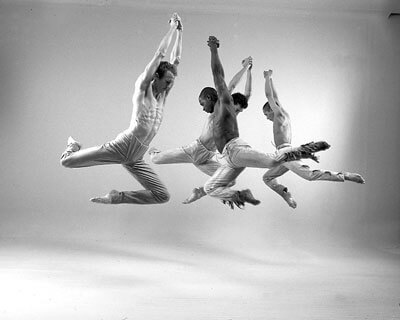Limón Dance Company pays tribute to a fallen member; stages several premieres
By GUS SOLOMONS JR.
The two-week season of the Limón Dance Company at the Joyce Theater, which runs through October 3, celebrates the life of longtime member Carlos Orta, who suddenly died last spring of a heart attack.
Surviving its founder, José Limón, for three decades, the company is a living repository of dances by its founder and his mentor Doris Humphrey, and a repertory company for modern works by other distinguished dance makers. Currently, the troupe is dancing with a technical and expressive power arguably not seen since its heyday thirty years ago.
Seven bare-chested men in maize-colored trousers face us in a phalanx as the curtain rises on “The Unsung,” Limón’s 1970 celebration of male dancing, a tribute to a pantheon of heroic Native American leaders. Only the sounds of accented breath, foot-stamping, hands slapping flesh––and a couple of errant cell phones––accompany this technically challenging essay, inspired by the movement of animals and the spirit of the American Indian warriors it represents.
After the opening group section, featuring the traditional circular patterns of tribal ritual and opposing groups moving in counterpoint, the dance uses masterful transitions to mitigate the predictability of seven solos. Each man, in turn, pulls off his display of difficult jumps, turns, falls and rolls, finding an epic identity within the athleticism. In order, Roel Seeber, Kurt Douglas, Charles Scott, Francisco Ruvalcaba, Raphaël Boumaïla, Robert Regala and Jonathan Riedel compose the sterling cast.
Next, a world premiere––the distaff counterpart of “The Unsung”––German choreographer Susanne Linke’s “Extreme Beauty.” She sets the bar high with the title. Five women shuffle toward us in a three-step rhythm, their hips gyrating more sinuously with each repetition. Roxanne D’Orléans Juste emerges as the greater of equals, with Kathryn Alter, Kristin Foote, Ryoko Kudo and Brenna Monroe-Cook joining her in a turbulent exposition of restlessness and frustration that sends them surging about the stage in a close-knit group.
Clever costumes by Marion Williams are transformed. Long narrow skirts reveal themselves to be culottes; the sides of one-sleeved tops break away, the shirts removed and tied around the dancers’ waists.
In the second part, “Flying Eros,” the women shove and trip each other in spiteful competition. Dissonant instrumental music by Gyorgy Kurtig and Salvatore Sciarrino adds dramatic tension.
Then, in “The Initiation,” the women in black-sheath dresses, traverse the stage singly, confined in a narrow path of white light. They adorn Juste, the last to appear, in a white hoop skirt, veil and vinyl wraparound gown, turning her into a bride, but with a thorny tiara and boa. They all don similar hoopskirts, topped off with a blood-red, high-heel pump as a hat, joining Juste as the bridesmaids. They glide, a la Russian folk dancers, nearly infinitely around the stage.
Finally, Foote, apparently liberated, wearing spike-heeled boots and miniskirt, saunters sexily across the stage, causing the others to snatch frantically at their pristine white gowns in envy. “Beauty” begins promisingly but loses inventive steam halfway through. Some judicious pruning could make the dance a commanding showcase for the company’s five strong women.
The company premiere of Lar Lubovitch’s 1986 “Concerto Six Twenty-Two” brings the program to a gratifying close. This light-hearted escapade with a heartbreakingly poignant men’s duet at its heart was Lubovitch’s response to the burgeoning AIDS crisis. The centerpiece depicts a loving, supportive relationship between two men.
Jonathan Riedel and Charles Scott are perfectly cast: muscular, sturdy Riedel moves with earthy weightedness, and lithe, lanky Scott, as innocently graceful as a deer, radiates ethereal lightness and quiet authority.

































